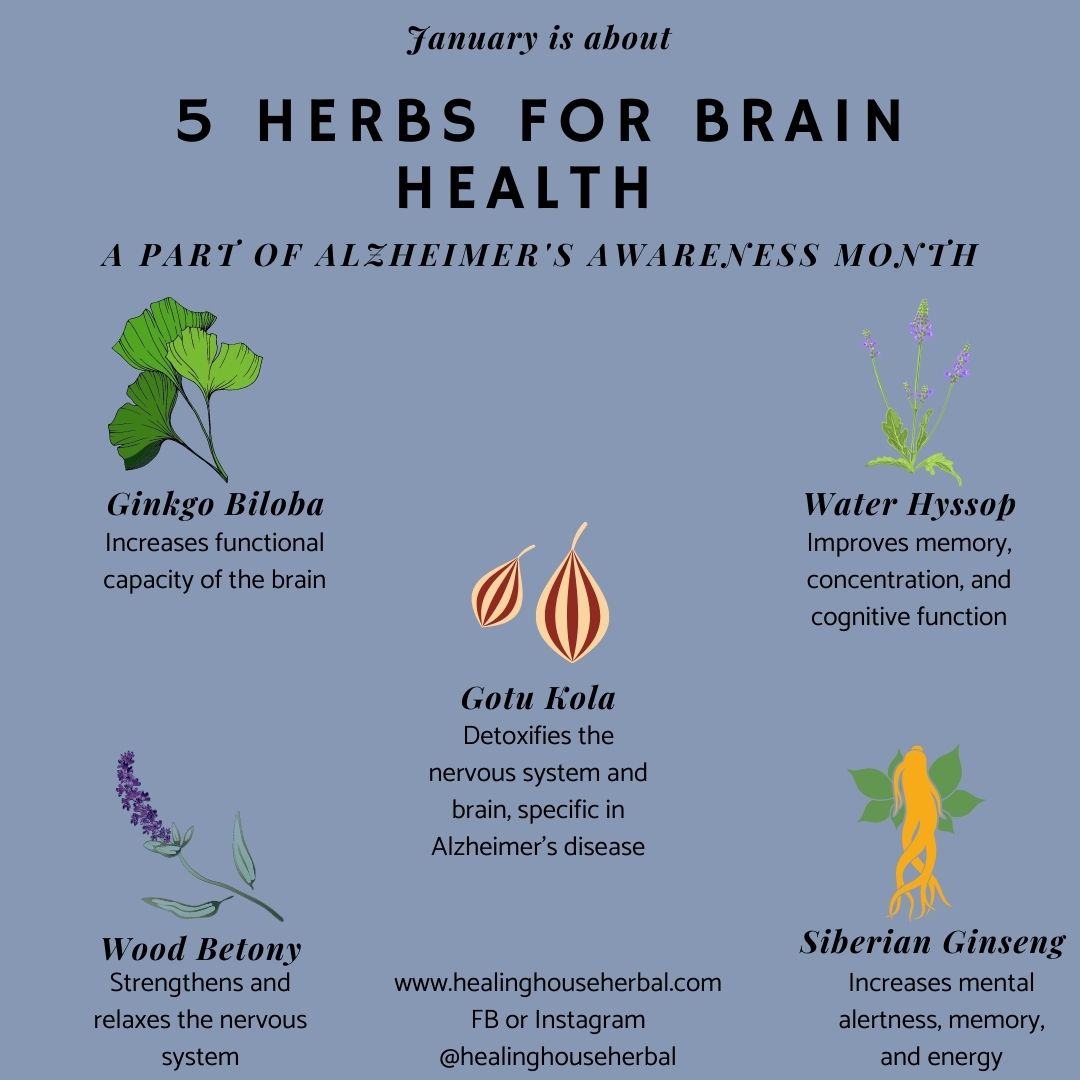|
January is Alzheimer's awareness month!
Today's 'Tip Tuesday' comes from Clinical Herbal Therapist, Petra Sovcov. Petra is the founder and wellness director at Healing House. She has a passion for herbal medicine and has been active with natural health and wellness since 2001. In practice, Petra has a focus on chronic inflammatory conditions and diseases and feels that many chronic health issues today are caused by environmental toxins and chronic food additives that trigger the body's inflammatory defenses. In the following blog post, you can learn some general info behind Alzheimer's and some of the herbs that are often used to assist in supporting the body naturally. Alzheimer's disease is a common type of dementia, or decline in intellectual function. Once considered rare, this disease is now known to affect as many as 5.3 million people in the US (Alzheimer's Association). It afflicts 10% of Americans over the age of 65, and as many as 50% of individuals over 85 years of age. This disease does not only affect the elderly, but may strike as early as the age of 40. Some of the common warning signs of Alzheimer's include: 1.Difficulty with familiar tasks. 2.Slipping job performance (if still working). 3.Language difficulties. 4.Confusion of place and time. 5.Lack of judgement. 6.Problems in abstract thinking. 7.Misplacing objects. 8.Mood fluctuations. 9.Changes in personality. 10.Lack of initiative. In Alzheimer's disease, memory and abstract through processes are impaired. It is considered an irreversible and progressive disorder in which critical parts of the brain are deteriorated - this deterioration may precede measurable symptoms by as much as 20 years. There have been studies done that have shown digestive malabsorption problems in individuals with Alzheimer's - leading to chronic nutritional deficiencies which may play a significant role in the pre-clinical phase of this disease. Additionally, studies have shown low levels of antioxidant vitamins such as A and E and the carotenoids within Alzheimer patients. These vital nutrients act as free radical scavengers, and chronic deficiencies may expose brain cells to increased oxidative damage. In the attached graphic, you can see some helpful herbs for brain health that assist with supporting neurotransmitters and can potentially mitigate oxidative damage, and increase mental clarity and stamina. A more in-depth picture of the herbs can be found below: Ginko (Ginko biloba)- Also known as Maidenhair tree, Ginkgo is considered to be an energy and cognitive enhancer, neuroprotective, adaptogenic, antioxidant, anti-inflammatory, brain/blood flow enhancer, circulatory stimulant, and nutritive. It is said to improve the brain's metabolism of glucose and oxygen and the usage of acetylcholine (ACh - a neurotransmitter and neuromodulator). It is said to promote blood flow to the brain, and to improve memory, concentration, cognitive, and overall brain function, making it a specific in cases of cognitive decline, dementia, and Alzheimer's disease. Water Hyssop (Bacopa monnieri) - This herb is traditionally considered to be a cognitive and memory enhancer, nerve and brain tonic, mild adaptogen, antioxidant, anti-inflammatory, cardiotonic, and bitter. Considered in cases where there is a need to improve memory and concentration, mental performance, and cognitive function and learning. It is considered to be a specific in Alzheimer's and also in Parkinson's disease as well as other types of issues where impaired mental function is present. Its constituents include steroidal saponins which increase protein kinase activity and protein synthesis in the long term memory brain region. These constituents also are said to have a reputation for increasing circulation in the brain and also to balance gamma aminobutyric acid (GABA) and glutamate in the brain, which in turn promotes orderly nerve firing. Gotu Kola (Centella asiatica) - This herb is considered to be a nervous system tonic, central nervous system relaxant, adaptogenic, anti-inflammatory, detoxifier, blood tonic, bitter, digestive, and a peripheral vasodilator. In regard to brain health it is said to promote longevity and to increase memory and concentration. It is traditionally used for mental and physical exhaustion and stress, but is also considered a specific in Alzheimer's disease, Parkinson's, and ADHD. Its root is rich in amino acids (alanine, serine, aminobutyrate, asparte, glutamate, histidine, lysine, and threonine, and is rich in anti-inflammatory flavonoids. It is also considered a detoxifier when it comes to heavy metals and heavy metal deposits stored in fatty tissues. Wood Betony (Stachys officinalis/Betonica officinalis) - A beautiful herb considered to warm and gladden the heart. Wood betony has a long standing relationship with brain and mental health and was used in medieval times for depression and melancholy. While this herb is not considered a specific for Alzheimer's, its helpful actions should not be ignored. It is considered to be a nervous system and general tonic, alterative, bitter, and circulatory tonic. It is used to both strengthen and relax the nervous system and to promote circulation to the brain and improve memory. It is excellent for stages of anxiousness and confusion brought on by various types of dementia and is used traditionally in states or irritability, nervous tension, depression, stress, anxiety, hysteria, and disturbed sleep. Often times this herb can be used when other serotonin balancing herbs cannot as it does not use the same pathways and has less contraindications than its close friend, St. John's Wort. Siberian Ginseng (Eleutherococcus senticosus) - This herb is excellent for bringing up energy levels without being overtly stimulating. It is considered to be a general and adrenal tonic, adaptogenic, antitoxic, immunomodulator, immunostimulant, immunoprotective, anti-inflammatory, circulatory stimulant, vasodilator, and bitter. Traditionally it is used in states where one needs to increase mental alertness, memory, concentration, energy, endurance, and resistance to states of chronic and acute stress. In in vivo studies it was shown to decrease adrenal hypertrophy and corticosteroid production. It was also shown to reduce the extent of the fight or flight reaction and reduces the exhaustive effects of long term stress which may accompany many Alzheimer's patients in early stages of the disease. In health and wellness, Petra As with all of the herbal information we post on our blog, the above is not meant as a means of diagnosis or treatment. The herbal information is not intended to replace advice or prescription drugs given to you by your doctor. If you have a medical issue, please see your medical doctor first and foremost. Also, please do not self dose on herbs, please see an appropriate practitioner to review dosage and potential contraindications as not all herbs are appropriate for all individuals.
7 Comments
|
Petra Sovcov is not a Medical Doctor (MD) nor a Naturopath (ND), she is a Clinical Herbal Therapist (CHT) and holds a Doctorate in Natural Medicine (DNM). The suggestions or recommendations made on this site are not meant to be a substitute for advice from your MD, or as a substitute for any prescriptions you may be taking. Suggestions followed will be the responsibility of the reader, and are stated with the intention of interest and education only. If you have a health issue, please see your primary care physician (MD) first and foremost. Categories
All
Archives
July 2024
|


 RSS Feed
RSS Feed